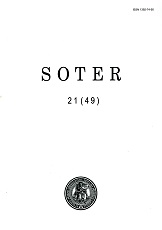Socialinių, psichologinių ir teisinių veiksnių reikšmė šeimos santykių transformacijai, sąlygojančiai tėvystės statuso sumenkinimą
Significance of social, psychological and legal factors to the family relations’ transformation determining devaluation of paternity status
Author(s): Marius Jonaitis, Kazimieras MeiliusSubject(s): Christian Theology and Religion
Published by: Vytauto Didžiojo Universitetas
Keywords: tradicinė šeima; alternatyvi šeima; statusas; vaidmuo; traditional family; alternative family; status; role,
Summary/Abstract: Similarly to the proletariat’s srive to compare itself with the bourgeousy the feinism’s strive to compare itselfwith the patriarchat or the striveof altrnatyve marriages into traditional ones results into tryig to create not only adequate, but more meaningful models that those system or institutional models that servd as examplary ones. Quite a smilar thing happenned with a family model. If earlier the family has always been the sexuality controlling institution, later, when sexuality regulating instruments were overtaken from the family, models characteristic to normal marriage or family life started to be abandoned and passing over to independent sexuality regulating society. Therefore a contemporary individual tries to abandon values of a stable traditional family life and become independent of it. However such an individual becomes dependent on biological feelings and, as numerous observations show, he, each time with more exhibicionistic agressivness, seeks to base his sexual neds on law. Nowdays family has become a strange topic. Even those who have parents, also brothers, sisters or kids, not always, due to their limited awareness, are able to answer the importance of the family or what its role is in the life of the society or an individual and how it can change people’s mutual relations. Domination of individual views diminishes feelings of social collectivism. The right to selfrealisation becomes predominate, feeling of fair is directed to undertaken commitments, total lack of common responsibility, because there exist a tendency to take one’s own and others’ life quie suppeficually. However, in the situation like this, everything that we tend to call self-realization, it becomes fole roles dictated by consumption society. Traditional marriage even in relatively modern times was the basis of marital relations: the husband provided for the family and wife took care of it. Nowadays forward external obligations are tendentiously liquidated. Marriage more and more becomes a relation that is initiated and continued till the tight contact and emotional satisfaction with the spouse is rendered. The modern concept of amity has the similar basis. A person is held a friend if the terms kept with him bring some reward. So, amity as well looses its meaning. Though obligations of the family can be quite week but these obligations are introduced directly by family relations through the ties of blood. Meanwhile friendly affection keeps the relation until the mutual feelings of nearness exist. That is why when personal relations are tested and filled with tension and satisfaction, the relation is aspired only because it gives something for the partners. Devaluated family relations lack traditional duties and obligations and are replaced with other relations based on satisfaction, pleasure and interest. Fluctuation of temper does not provide the stability of relation for which the unity of rights and obligations is set by the status of person.
Journal: SOTER: religijos mokslo žurnalas
- Issue Year: 49/2007
- Issue No: 21
- Page Range: 121-152
- Page Count: 32
- Language: Lithuanian

